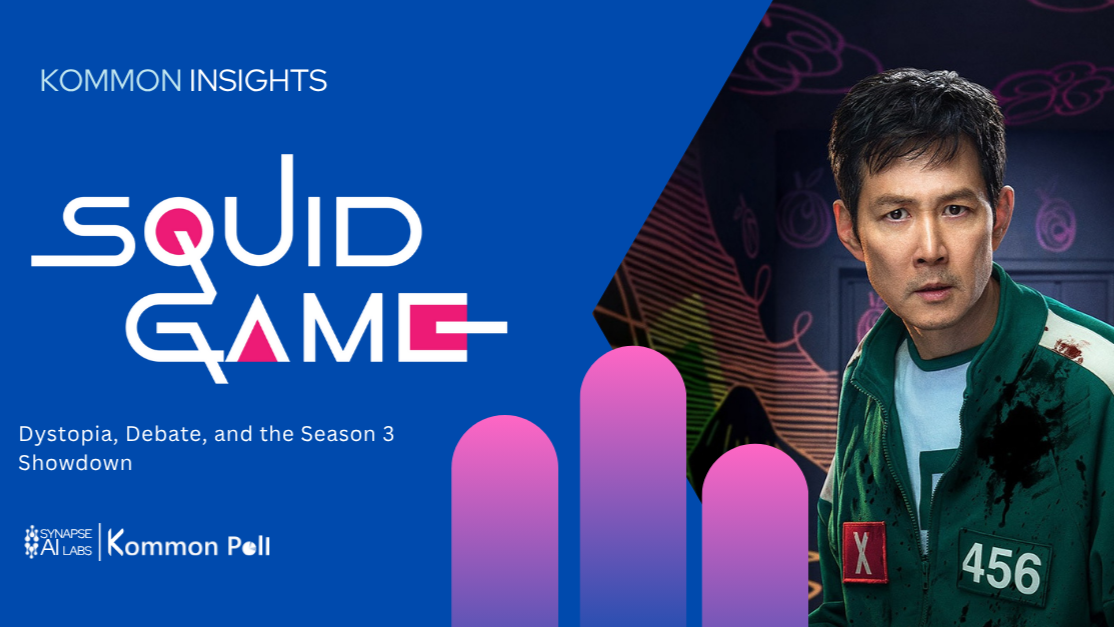When debt and desperation collide in deadly children’s games, Squid Game holds up a mirror to our world and global audiences couldn’t look away. From its record-shattering 2021 debut to its divisive Season 3 finale on June 27, 2025, the South Korean thriller has sparked nonstop conversation about inequality, morality, and power. In this deep-dive edition, we revisit Squid Game’s social critique, chart its rise to phenomenon status, unpack the Season 3 buzz (both praise and backlash), and explore what it all means for culture and for brands that want to stay ahead of the game.
Notable Celebrity & Media Voices

Before we dive in, here are five highlights that kept Squid Game trending worldwide:
- Jeff Bezos praised Netflix’s “internationalization strategy” and admitted, “(And I can’t wait to watch the show.)”
- LeBron James confided he “didn’t like the ending” of Season 1, tweeting, “Bro, go see your daughter!”
- Elon Musk memes exploded after creator Hwang Dong-hyuk quipped VIPs “do kind of resemble Elon Musk.”
- Margot Robbie (Barbie) lauded the pink guard uniforms as “unexpected fashion icons” in a recent interview.
- Greta Thunberg invoked Squid Game in a climate speech: “Like Squid Game, we’re playing a deadly game with our planet and the rules are rigged.
These voices show how Squid Game transcended screens to spark debates in tech, sports, fashion, and activism.
1. A Dark Mirror of Capitalism
Squid Game begins with a stark premise: debt-ridden contestants risk everything in lethal versions of childhood games, cheered on by masked billionaires. Each twisted round is a searing metaphor for:
- Economic Inequality: Contestants, saddled by medical bills, loans, and predatory lenders, willingly face death for one life-changing payday.
- Capitalist Competition: The series amplifies how real-world systems pit individuals against each other winner takes all, losers vanish.
- Moral Ambiguity: Acts of kindness (sharing a candy, sacrificing oneself) clash with opportunism and betrayal, questioning whether empathy can survive desperation.
Season 3 deepen s this critique: the VIPs not only unmask themselves but don guard uniforms to personally execute losers—an explicit statement that the powerful no longer hide their cruelty. The addition of new, grotesquely opulent game arenas (crystal-clear aqueduct mazes, Möbius-strip staircases) reinforces how the elites weaponize spectacle for profit.
2. From Seoul to the World Stage
How did a Korean-language drama shatter records and dominate global culture? Key factors:
- Record Launch: 111 million viewers in its first month Netflix’s biggest debut ever and Top 10 in 94 countries simultaneously.
- Viral Challenges: The Dalgona candy game spawned thousands of TikTok tutorials; #RedLightGreenLight accrued over 2 billion views on Instagram alone.
- Iconic Imagery: The green tracksuit and pink-masked soldier have been the No. 1 Halloween costume in 20 markets for two consecutive years.
- Cross-Industry Hype: Talks of a Hollywood spin-off (David Fincher attached), a Fortnite crossover, and a branded Subway sandwich illustrate corporate eagerness to hitch rides on the phenomenon.
By proving a culturally rooted story can wield universal themes, Squid Game rewrote the playbook on global entertainment.
3. Four Years of Evolution

4. The Season 3 Finale: Who Won—and Who Lost?
Released June 27, Season 3’s ending stunned fans: a newborn, declared final victor, inherits the ₩45.6 billion prize, while masked VIPs walk away unpunished. Reactions split along three camps:
Critical Acclaim:
- Rotten Tomatoes: 83 % critic score, hailed as “bleak but resonant.”
- Trade Press:Variety called it “a fittingly audacious climax,” praising its visual ambition and thematic consistency.
Fan Backlash:
- “No Justice!”: Many felt hero Seong Gi-hun’s sacrifice was wasted villains escape, baby wins by design. Comparisons to the Game of Thrones finale pointed to “narrative overreach.”
- CGI Baby Criticism: The infant’s animation drew ridicule, with some memes dubbing it “Babyzilla.”
Defender POV:
- Intentional Nihilism: Viewers argue the ending’s cruelty is purposeful—a brutal reminder that in real systems, the powerful often escape consequences, and the vulnerable inherit their chaos.
- Thematic Symmetry: By passing the prize to a baby, the show underscores the responsibility incumbents have to future generations—a final plea for systemic change.
Across social feeds, hashtags like #SquidGameFinale and #JusticeDenied trended simultaneously, illustrating the finale’s polarizing effect.
5. Public Figures’ Hot Takes
- Priyanka Chopra Jonas: “A gut-wrenching commentary on survival and sacrifice” praised the emotional depth.
- Taika Waititi: “If Hollywood is grim, Squid Game is apocalyptic” tweeted a week after the finale.
- Greta Thunberg: Referenced Squid Game in a climate forum: “Our planet is the arena; the stakes are extinction.”
These cross-sector endorsements highlight how the series’ themes resonate beyond entertainment.
6. In the Data: Kommon Poll Insights


7. Trending Opinions & Social Listening Highlights
- Justice vs. Nihilism: 48 % of comments expressed disappointment over lack of poetic justice; 37 % praised the show’s unapologetic darkness; 15 % were neutral or undecided.
- Meme Mania: “Infant champion” memes peaked at 500 K posts within 24 hours; “VIP unmask reveal” filters saw 1.2 million uses on Instagram Stories.
- Regional Nuance:
- Platform Spotlight: Twitter drove rapid-fire reactions, while richer debate threads on Reddit accumulated 120 K comments under r/SquidGame finale threads.
8. Why It Matters for Brands
- Cultural Currency: Aligning with a phenomenon like Squid Game can boost brand relevance if done thoughtfully.
- Authentic Engagement: Surface-level tie-ins risk backlash; successful campaigns tap into core themes (e.g., empathy under pressure).
- Real-Time Pivoting: Kommon Poll’s social listening lets you detect sentiment shifts instantly and adjust campaigns before tone-deaf moments go viral.
9. Lessons for Marketers & Creators
- Embrace Nuance: Bold, layered narratives drive deeper engagement than simple slogans.
- Monitor the Pulse: Track sentiment in real time be ready to lean in or pull back.
- Foster Dialogue: Use campaigns to spark discussion, not just broadcast messages.
- Partner Authentically: Celebrity or influencer tie-ins should reflect genuine alignment with your brand’s values.
10. The Next Game: Spin-Offs & American Horizon
- No Season 4: Creator Hwang Dong-hyuk confirms Season 3 is the final chapter of the main series, no fourth season is planned, preserving the creator’s original vision for Gi-hun’s arc.
- English-Language Spinoff Brewing: Industry whispers point to Netflix exploring an English-language spinoff, with acclaimed director David Fincher potentially attached—as hinted by a surprise Cate Blanchett cameo in the Season 3 finale.
- Squid Game: USA on the Horizon?: The Los Angeles setting of the finale’s closing scene where Front Man glimpses a mysterious recruiter playing ddakji fueled speculation of a U.S. version, though Netflix has yet to officially greenlight the project.
- Reality Series Continues: Beyond scripted spin-offs, the real-life competition show Squid Game: The Challenge has been renewed for a second season, underscoring the franchise’s expanding universe.
► Ready to turn social buzz into strategic advantage? Start your free Kommon Poll trial and lead conversations, not chase them—whether you’re planning your next campaign or simply staying ahead of the game.




